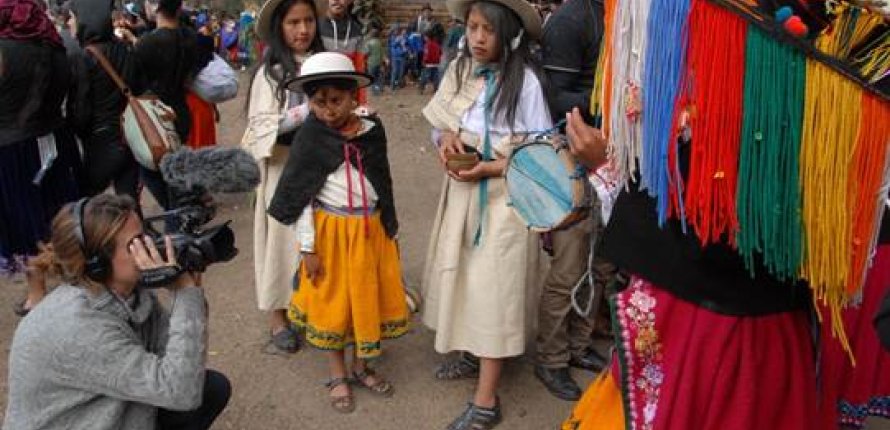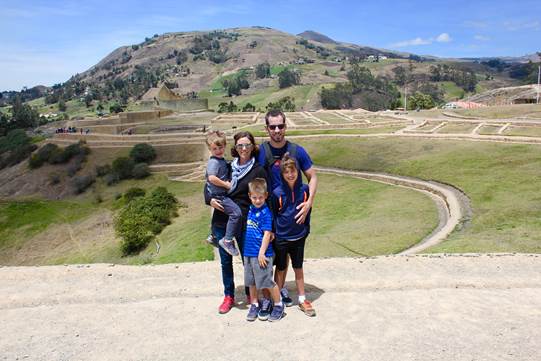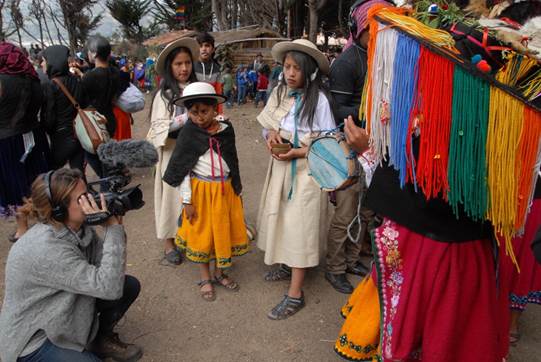Adaptability and the Unexpected: Making Ecuador Home for a Fulbright Family

Allison Adrian, Professor of Music and Women's Studies at St. Catherine University
2015-2016 Core Fulbright U.S. Scholar to Ecuador
 I would not describe my family as adaptable. Before our departure for Ecuador, my four-year-old refused to expand his palate beyond noodles; my six-year-old exclaimed that he would teach everyone English instead of learning Spanish; and my nine-year-old’s primary goal for our time in Ecuador was to maintain his mileage in his Minnesotan running club.
I would not describe my family as adaptable. Before our departure for Ecuador, my four-year-old refused to expand his palate beyond noodles; my six-year-old exclaimed that he would teach everyone English instead of learning Spanish; and my nine-year-old’s primary goal for our time in Ecuador was to maintain his mileage in his Minnesotan running club.
Yet, we came.
Ecuador welcomed us with open arms, and a heavy dose of commentary on our children’s blue eyes. Our kids learned how to navigate flocks of humans swarming around them, mosh-pit style, at school. Fortunately, our four-year-old now proudly carries an “ate everything” check on his daily school agenda; our six-year-old greets everyone he encounters on the street by bellowing, ““¿Como estás? ¿De dónde eres?”; and our nine-year-old has spent more time on after-school ping-pong than running.
Being the new, foreign kids was beguiling, but the charm would wear off. We signed up for Spanish classes and after-school activities. Hoping to create multiple points of connection for our kids, we inquired about children in the neighborhood as we looked at homes to rent.
We soon discovered that Cuenca, Ecuador is a lot like our homeland of Minnesota – often described as “Minnesota Nice” or perhaps more appropriately as “Minnesota Ice”. People are friendly, but private, preferring to invite people into their homes and lives only after they have developed profound histories with them. The initial investment in our communities paid off as birthday and dinner invitations trickled in.
 Our gravest concern has turned out not to be adaptability, but something we never could have predicted: a devastating 7.8 magnitude earthquake that shook the country on April 16th. We were lucky to have had months of integration behind us, and therefore a solid network of friends, neighbors, and colleagues who checked in on our well-being, and included us in efforts to support those affected on the coast. A stream of messages from my children’s school, Santana, and my host institution, Museo Pumapungo, flooded my phone. Parents, colleagues, administrators, and teachers were collecting water, mattresses, food, clothing, pots and pans, and an ever-changing array of items dependent on the latest municipal messages from the coast.
Our gravest concern has turned out not to be adaptability, but something we never could have predicted: a devastating 7.8 magnitude earthquake that shook the country on April 16th. We were lucky to have had months of integration behind us, and therefore a solid network of friends, neighbors, and colleagues who checked in on our well-being, and included us in efforts to support those affected on the coast. A stream of messages from my children’s school, Santana, and my host institution, Museo Pumapungo, flooded my phone. Parents, colleagues, administrators, and teachers were collecting water, mattresses, food, clothing, pots and pans, and an ever-changing array of items dependent on the latest municipal messages from the coast.
Cuenca was a city transformed by an earthquake it barely felt. Donation centers popped up on every corner. The indigenous musicians I work with organized benefit concerts in the streets and at institutions like University of Cuenca. Our family’s first response was fear, then curiosity about how we, in these special circumstances, could help. We donated clothes, food, and, water, but how could we mobilize efforts differently, as North Americans temporarily living in Ecuador?
The answer came not from us, but from the teachers and administrators at our children’s Minnesotan school, Meadowbrook Elementary. Would we help them start a campaign to raise money for those affected by the quake, encouraging students from kindergarten to 6th grade, to bring in “quarters for quake victims”? So far the children of Meadowbrook have donated more than $2000, or 8,000 quarters.
The best part of having a Fulbright experience with my family is the way it has enhanced our community and deepened our connection with Ecuadorians. I have met at least four times the people I would have without my family. I know my children’s classmates, their parents, teachers, staff at the school, children from the neighborhood, my husband’s soccer teammates, as well as all of the colleagues I have met through my research: an impressive indigenous network of educators, community leaders, and accomplished musicians. The Fulbright experience has exponentially expanded our community at the same that that is has deepened our roots in our beloved homeland of Minnesota.
